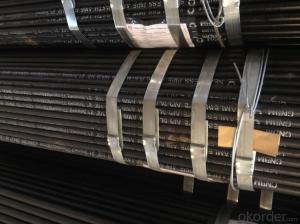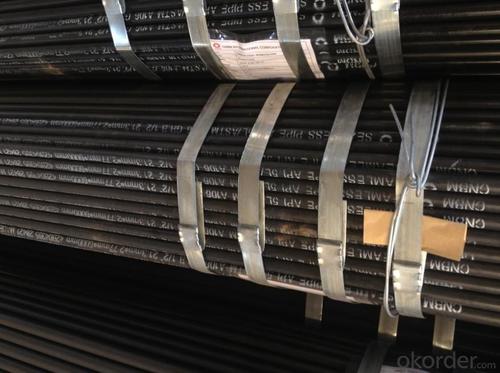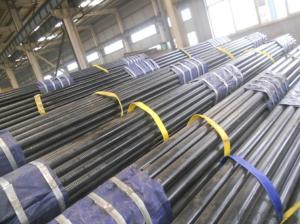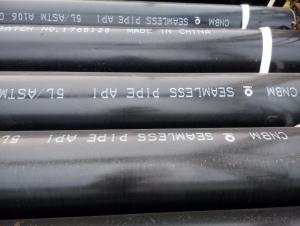20# Seamless steel black pipe ASTM A106/API 5L/ASTM A106 GR.B
- Loading Port:
- Tianjin
- Payment Terms:
- TT OR LC
- Min Order Qty:
- 10 m.t.
- Supply Capability:
- 1000 m.t./month
OKorder Service Pledge
OKorder Financial Service
You Might Also Like
1. Commodity Name: Seamless steel pipe
2. Standard: API,GB,ASTM,ASME,DIN
3. Quality grade: 10#, 20#, A106B, A53B, API 5L B, Q235, Q345, ST37-2, ST 45, ST52.etc.
4. Dimension:
OD: 1/2"-24"
WT: 2.5-80mm, SCH10~SCH40~XXL
length: 5.8m,6m,8m,9m,12m
5. Technique: Hot Rolled/Cold Rolled/ Cold Drawn
6. application
carbon seamless steel pipes are widely used in gas, water and oil, transpotation;constructions;Bridge,highway,windows of model steel door; building materials;fences;heating facilities Fluid Pipe;conduit pipe,scaffolding pipe.etc.
7. Payment Terms: L/C D/A D/P T/T
8.packing and shipment
Packaged in bundles,as per customers' requirements, it can also bepackagesd as beveled ends, typed marking, black painting, plastic caps protection,woven bags packing
For 20" container the max length is 5.8m; For 40" container the max length is 12m. other options are available based on customer requests. Please discuss when placing orders.
9. Surface: painted with varnish;
10. Plastic caps at ends.
11. Tolerance: OD +1%/-1%
WT +12.5%/-10%
12. Chemical composition:
Models of Steel Pipes | Chemical Component | |||||||
Steel 20 (ASTM A106B) | C | Si | Mn | P | S | Cu | Ni | Cr |
0.17~0.24 | 0.17~0.37 | 0.35~0.65 | 0.035max | 0.035max | 0.25max | 0.25max | 0.25max | |
Steel45 (ASTM 1045) | 0.42~0.50 | 0.17~0.37 | 0.50~0.80 | 0.035max | 0.035max | 0.25max | 0.25max | 0.25max |
16Mn(Q345B) | 0.12~0.20 | 0.20~0.55 | 1.20~1.60 | 0.035max | 0.035max | 0.25max | 0.25max | 0.25max |
45Mn2 ( ASTM1345) | 0.42~0.49 | 0.17~0.37 | 1.40~1.80 | 0.035max | 0.035max | 0.3max | 0.3max | 0.30max |
- Q: How do you inspect steel pipes for defects?
- Inspecting steel pipes for defects involves a systematic approach that combines visual inspection, non-destructive testing (NDT) techniques, and specialized equipment. Here are the steps typically followed to inspect steel pipes for defects: 1. Visual Inspection: Start by visually examining the external surface of the pipe, looking for any visible signs of defects such as cracks, dents, or corrosion. Pay close attention to welds, joints, and areas susceptible to stress or damage. 2. Ultrasonic Testing (UT): Ultrasonic testing is commonly used to detect internal defects in steel pipes. It involves using ultrasonic waves that are sent into the pipe and then interpreted based on the echoes received. Any irregularities in the internal structure, like cracks or voids, can be identified and analyzed. 3. Magnetic Particle Inspection (MPI): MPI is a widely used technique to detect surface and near-surface defects such as cracks, seams, or other discontinuities. This method involves applying a magnetic field to the pipe and then applying ferromagnetic particles (usually iron-based) on the surface. These particles will accumulate and form visible indications at the areas of magnetic flux leakage caused by defects. 4. Eddy Current Testing (ECT): Eddy current testing is suitable for detecting surface and near-surface defects in conductive materials like steel. It involves inducing an alternating current into the pipe and monitoring the changes in the electrical currents induced by any defects present. These changes are then analyzed to identify and evaluate the defects. 5. Radiographic Testing (RT): Radiographic testing is performed by exposing the steel pipe to X-rays or gamma rays and capturing the resulting radiographic images. This technique allows for the detection of internal defects such as cracks, porosity, inclusions, or wall thickness variations. The radiographic images are then examined for any indications of defects. 6. Dye Penetrant Inspection (DPI): DPI is a method used to detect surface-breaking defects in steel pipes. It involves applying a liquid dye on the surface, which penetrates into any surface cracks or flaws. After allowing the dye to seep in and adequately react, excess dye is removed, and a developer is applied to draw out the dye from the defects, making them visible. 7. Pressure Testing: Pressure testing involves pressurizing the steel pipe to a predetermined level and monitoring for any pressure drops or leaks. This test ensures that the pipe can withstand the required pressure without any structural defects. It is important to note that the inspection technique used depends on various factors, such as the type of defect being sought, the size and nature of the pipe, and the specific industry standards and regulations. Inspection professionals with expertise in NDT methods and equipment are typically employed to ensure accurate and reliable results.
- Q: Can steel pipes be used for underground sewage systems?
- Yes, steel pipes can be used for underground sewage systems. Steel pipes have high strength and durability, making them suitable for carrying sewage and withstanding the pressure and environmental conditions underground. Additionally, steel pipes have excellent corrosion resistance properties, which is crucial for sewage systems that are exposed to moisture and various chemicals.
- Q: Can steel pipes be used for underground fuel storage tanks?
- Underground fuel storage tanks can indeed utilize steel pipes. These pipes find wide application in various fields, including underground fuel storage tanks. Their strength, durability, and resistance to corrosion enable them to serve as suitable long-term storage options for fuels like gasoline, diesel, and oil. Moreover, the weldability of steel pipes allows for the creation of seamless and secure tank structures. Nevertheless, it is crucial to ensure that the steel pipes employed in underground fuel storage tanks are appropriately coated with corrosion-resistant materials. This precautionary measure shields the pipes from potential damage that may arise due to exposure to moisture or the chemicals present in the fuel. Consistent inspection and maintenance procedures are also imperative to uphold the tank's integrity and avert leaks or environmental hazards.
- Q: How are steel pipes used in the oil and gas pipeline transportation?
- Steel pipes are widely used in the oil and gas industry for pipeline transportation due to their durability, strength, and resistance to corrosion. These pipes are specifically designed to withstand high pressure and transport various types of fluids, including crude oil, natural gas, and refined petroleum products. In oil and gas pipeline transportation, steel pipes are primarily used for three main purposes: gathering, transmission, and distribution. Gathering pipelines are responsible for collecting oil and gas from the production wells and transporting them to processing facilities. Steel pipes are used in these pipelines due to their ability to withstand the harsh conditions of the extraction sites and effectively transport the fluids over long distances. Transmission pipelines are used to transport oil and gas over vast distances, sometimes spanning across countries or continents. Steel pipes are ideal for this purpose as they can handle high pressure, ensuring the efficient flow of fluids over long distances. These pipes are often buried underground or submerged in water to protect them from external elements and minimize the risk of damage. Distribution pipelines are responsible for delivering oil and gas to end-users, such as homes, businesses, and industrial facilities. Steel pipes are commonly used in these pipelines as they can handle the varying demand and pressure requirements of different consumers. These pipes are often smaller in diameter compared to transmission pipelines but still provide reliable and safe transportation of oil and gas to their final destinations. In addition to their strength and durability, steel pipes used in oil and gas pipeline transportation are also coated or lined with various materials to enhance their resistance to corrosion and minimize the risk of leaks. These protective coatings and linings ensure the longevity of the pipes and maintain the integrity of the transported fluids. Overall, steel pipes play a crucial role in the oil and gas industry by providing a reliable and efficient means of transporting oil and gas from production sites to processing facilities and ultimately to end-users. Their durability, strength, and resistance to corrosion make them an ideal choice for pipeline transportation in this industry.
- Q: Seamless steel tube with the tube with what is the difference?
- Seamless steel tube is integrally formed with welded steel pipe steel plate butt welding and welding seam.
- Q: Are steel pipes suitable for use in pharmaceutical industries?
- Yes, steel pipes are suitable for use in pharmaceutical industries. They are commonly used in pharmaceutical manufacturing processes as they offer excellent corrosion resistance, durability, and cleanliness. Additionally, steel pipes can withstand high pressure and temperature conditions required for sterilization and the transportation of various pharmaceutical liquids and gases.
- Q: What are the safety measures to consider when working with steel pipes?
- When working with steel pipes, there are several safety measures to consider. Firstly, it is essential to wear appropriate personal protective equipment (PPE) such as safety glasses, gloves, and steel-toed boots to protect against potential hazards. Additionally, workers should be cautious of sharp edges and take necessary precautions to avoid cuts or lacerations. Furthermore, it is crucial to implement proper lifting techniques and use appropriate lifting equipment when handling heavy steel pipes to prevent back injuries. Adequate training and supervision should be provided to ensure workers are aware of the correct procedures. Another safety measure is to secure the pipes properly to prevent them from rolling or falling, which can cause injuries or damage. Regular inspections of the pipes and the work area should be conducted to identify and rectify any potential hazards. Lastly, workers should be trained on fire safety measures and have access to fire extinguishers or other firefighting equipment in case of emergencies. Proper ventilation should also be ensured when working with steel pipes to avoid inhalation of hazardous gases or fumes. Overall, adhering to safety protocols, using appropriate equipment, and being aware of potential hazards are crucial safety measures when working with steel pipes.
- Q: What is a steel pipe?
- A steel pipe is a cylindrical hollow tube made primarily of steel, commonly used for transferring fluids and gases, as well as structural applications in construction and industrial settings.
- Q: What is the impact resistance of steel pipes?
- Steel pipes have a high level of impact resistance thanks to the natural properties of steel. Steel, known for its strength and durability, can endure substantial external forces and impacts without deforming or breaking. The impact resistance of steel pipes is further improved by their construction and design. Various manufacturing techniques, such as seamless or welded construction, are used to create steel pipes, ensuring uniformity and strength throughout the structure. This construction process eliminates weak points or seams that could compromise the pipe's impact resistance. Additionally, steel pipes can be customized to meet specific impact resistance requirements based on their intended use. Different grades and types of steel can be utilized to achieve varying levels of impact resistance, allowing for customization to suit different industries and environments. The excellent impact resistance of steel pipes is particularly advantageous in industries such as construction, oil and gas, and transportation. These industries subject pipes to heavy loads, pressure, and potential impacts. Steel pipes can withstand these harsh conditions, making them a dependable choice for a wide range of applications. To summarize, steel pipes have outstanding impact resistance due to the inherent strength and durability of steel, as well as the construction techniques employed during manufacturing. Steel pipes can withstand significant external forces and impacts, making them a reliable and sturdy option for various industries and applications.
- Q: What are the advantages of using steel pipes over other materials like PVC or copper?
- There are several advantages of using steel pipes over other materials like PVC or copper. Firstly, steel pipes are extremely durable and can withstand high pressure and extreme temperatures, making them ideal for various applications including industrial and underground use. Secondly, steel pipes have a longer lifespan compared to PVC or copper, reducing the need for frequent replacements and maintenance. Additionally, steel pipes are more resistant to corrosion and are not prone to cracking or leaking, ensuring a reliable and leak-free plumbing system. Lastly, steel pipes have a higher fire resistance rating compared to PVC, making them a safer option for certain environments.
Send your message to us
20# Seamless steel black pipe ASTM A106/API 5L/ASTM A106 GR.B
- Loading Port:
- Tianjin
- Payment Terms:
- TT OR LC
- Min Order Qty:
- 10 m.t.
- Supply Capability:
- 1000 m.t./month
OKorder Service Pledge
OKorder Financial Service
Similar products
Hot products
Hot Searches
Related keywords

























